The 2019 UK financial wellbeing survey
Financial wellbeing is about a sense of security and feeling as though you have enough money to meet your needs. A strong financial wellbeing comes from being in control of your day-to-day finances and having the financial freedom to make choices that allow you to enjoy life.
But with living costs ever-rising and the country’s economic future feeling unpredictable, is the public’s financial wellbeing suffering?
Perkbox conducted a study of 1,139 people to discover how people feel about their finances, the main causes of financial stress and how many are making changes to their lives to tackle these feelings.
The key findings include:
- Money is the biggest cause of stress for employed adults.
- Over a quarter of adults feel stressed about finances every single day.
- The top factors contributing to financial stress are feeling behind 'financially compared to those around us', 'not being able to afford unexpected costs' and 'feeling unable to reach future goals'.
- Almost 1 in 5 employed adults would describe their financial wellbeing as ‘poor’ or ‘very poor’.
- The majority of adults believe that it will take 1–5 years until they are satisfied with their financial situation – regardless of current age.
Money is the biggest cause of stress in the UK
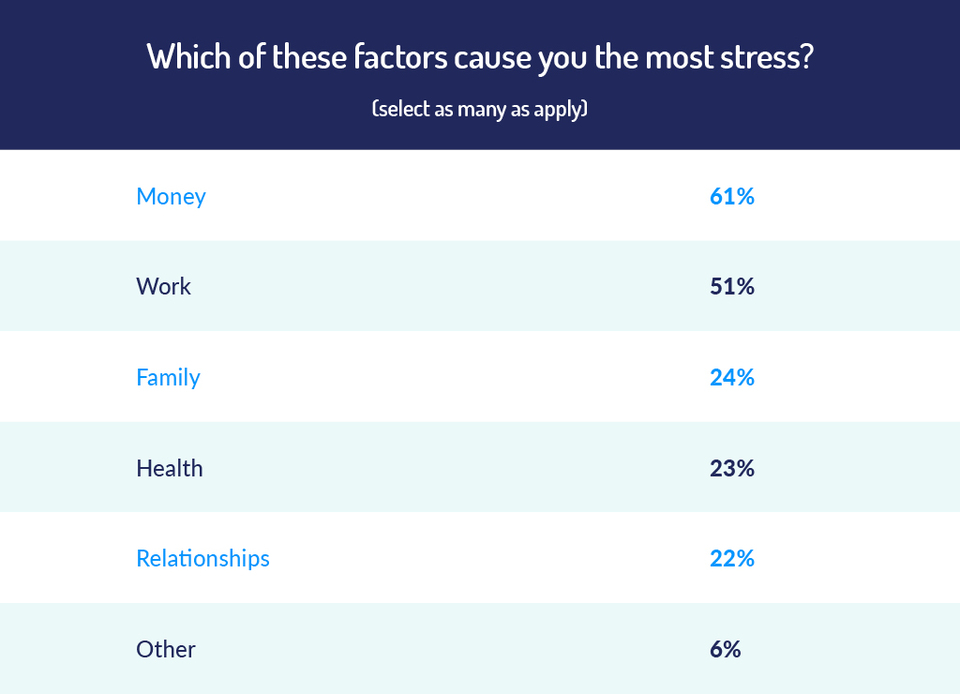
61% of employed adults state that money is the factor that causes them the most stress.
The next biggest cause of stress is work (51%), followed by family (24%), health (23%), and relationships (22%).
Over a quarter of adults experience financial stress on a daily basis
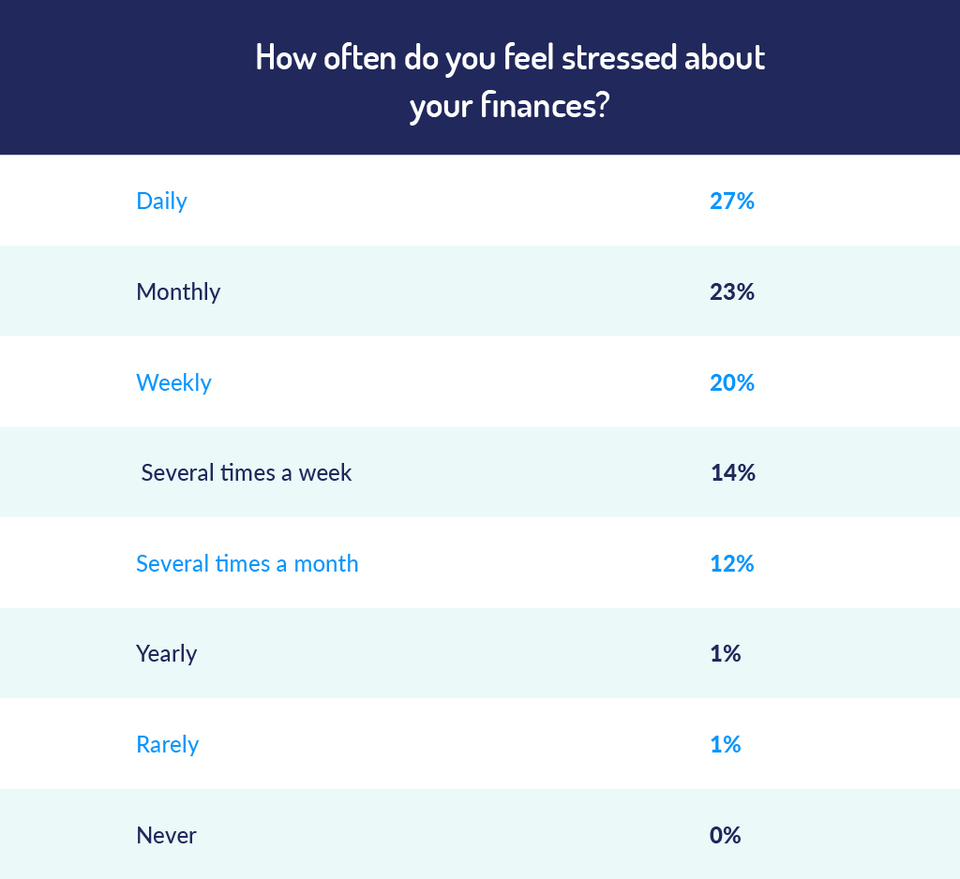
The study revealed that a staggering 27% of UK adults feel stressed about money every single day. This frequency is also the most common regularity for how often people experience financial stress.
A further 14% of adults experience financial stress several times a week, while 23% experience these concerns on a monthly basis.
The study revealed that 0% of the public would describe themselves as ‘never’ feeling stressed about money and just 1% stated that they ‘rarely’ experience this type of stress.
Almost 1 in 5 employed adults describe their financial wellbeing as ‘poor’ or ‘very poor’
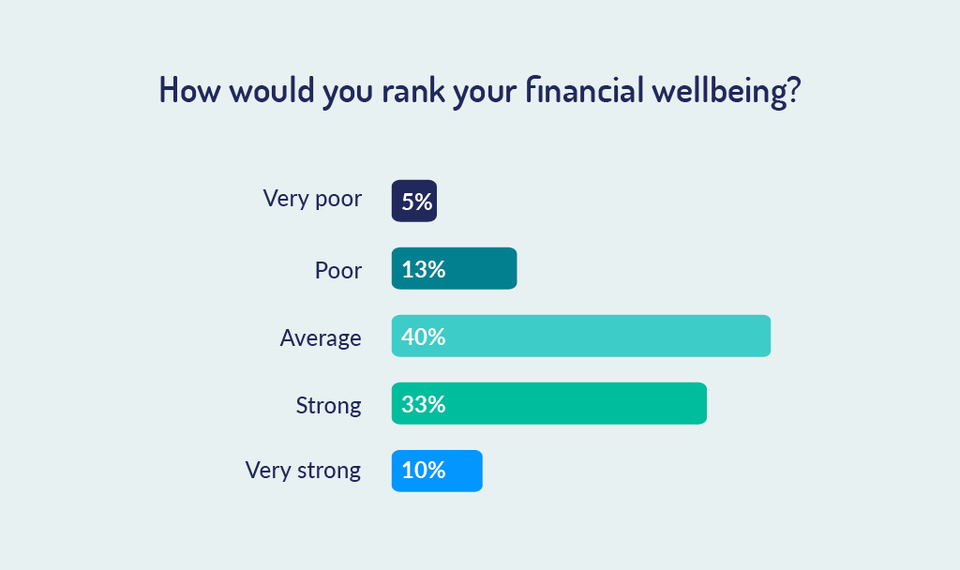
Looking into how secure and in-control employed adults feel financially, the data reveals that 18% of employed adults describe their current financial wellbeing as ‘poor’ or ‘very poor’.
Viewing this data on a scale of 0–4, with 0 being ‘very poor’ and 4 being ‘very strong’, the UK’s average financial wellbeing is 2.3 – verging just over ‘poor’ into ‘average’ territory. This begs the question of what more can be done to improve the financial wellbeing of the UK’s workforce.
Interestingly, despite women feeling more regularly stressed about their finances – men rank their financial wellbeing as worse than women. 19% of men state that their financial wellbeing is poor or very poor, whilst 16% of women say the same.
Moreover, those within the 25–34 age group rate their financial wellbeing worst out of all age ranges, with 19% in this age range rating their financial wellbeing as ‘poor’ or ‘very poor’, compared to just 11% of the 55+ age group.
Download now: Employee financial wellbeing - your ultimate guide
Relationships, work and health are all impacted by financial worries
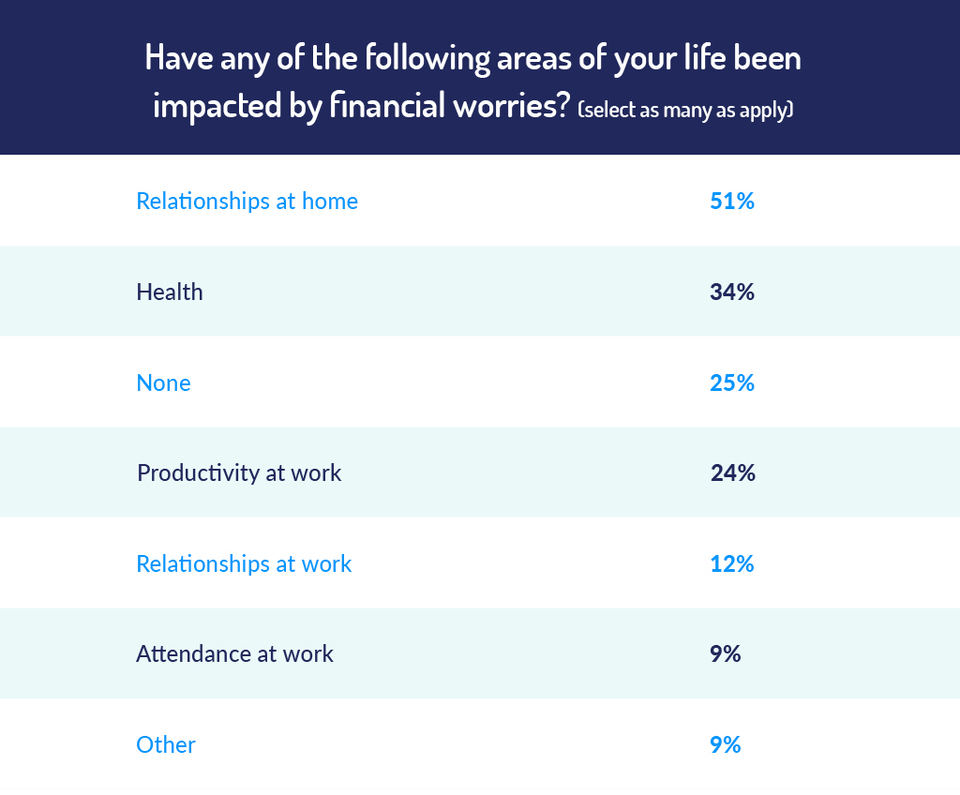
Stress doesn’t just impact the person experiencing it themselves, it often affects the people around them too.
A huge 51% of adults state that their relationships at home have been impacted by financial worries, while almost a third have experienced an impact to their health.
These impacts aren’t just limited to personal lives either. Almost a quarter (24%) feel that their productivity at work has been impacted by financial stress and 12% of relationships at work have also been impacted.
A further 9% state that their attendance at work has been affected too.
Ultimately, with financial stress impacting work lives, this could lead to a vicious cycle. This could highlight that workplaces need to do more to work with their employees to improve financial wellbeing in the future, especially given the role that employee wellbeing has in high-performance teams.
Does the UK’s financial behaviour warrant these feelings?
Within the survey, respondents were asked to describe their attitude towards money.
The most common financial behaviours were found to be:
- 42% – Sensible spenders–- ‘I like to enjoy life in the present rather than focus on saving, but live within my means’
- 34% – Savers – ‘I find ways to save money and put money aside for the future’
- 24% – Givers – ‘I make sure others are taken care of before myself’
- 22% – Careless spenders – ‘I spend more than I should and then worry about my finances’
- 9% – Relaxed – ‘I pay little attention to my finances’
- 4% – Investor – ‘I invest and possibly take risks in the hope that I will have a financially secure future’
With the majority of Brits describing themselves as sensible spenders and savers, it seems that the UK is acting mindfully with their finances, begging the question of what is causing these feelings of financial instability and insecurity?
Feeling financially behind in comparison to others is more stressful than keeping up with debts or being able to meet monthly expenses
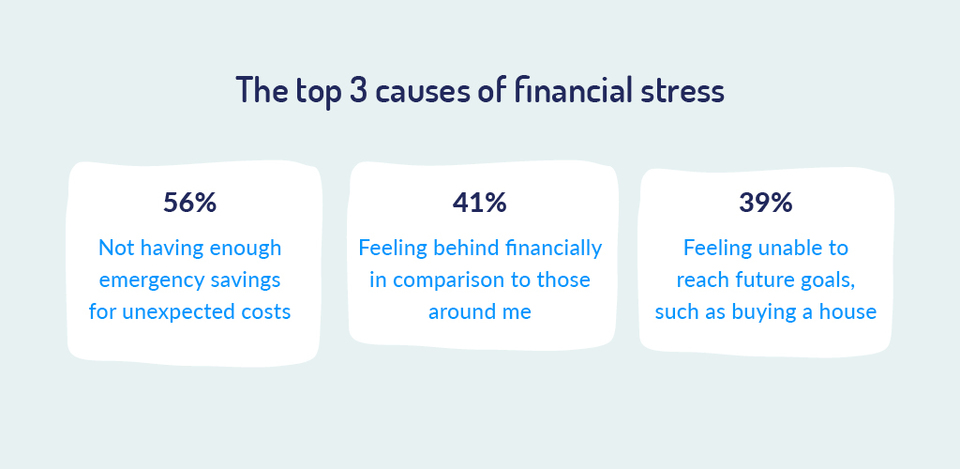
When asked which financial factors cause the most stress, ‘not having enough emergency savings for unexpected costs’ was the most common answer, with 56% stating that this worry brings them the most stress.
But a more surprising factor took second place as the most common cause of stress.
It appears that pressures, possibly stemming from sources such as social media, are also causing a huge factor of concern. 41% of adults stated that ‘feeling behind financially in comparison to those around me’ is one of their biggest causes of financial stress, followed by 'feeling unable to reach future goals, such as buying a house' which affects 39%.
The results revealed that numerous factors are impacting financial wellbeing.
Top 10 causes of financial stress:
1. Not having enough emergency savings for unexpected costs – 56%
2. Feeling behind financially in comparison to those around me – 41%
3. Feeling that I will be unable to reach future goals, e.g. buying a house – 39%
4. Feeling limited in my career/salary progression – 37%
5. Struggling to afford special occasions like Christmas – 33%
6. Not being able to retire when I want to – 32%
7. Having to miss out on events and social occasions – 28 %
8. Not being able to meet monthly expenses – 27%
9. The fear of losing my job – 24%
10. Not being able to keep up with debts – 20%
Women are more stressed than men by trying to meet monthly expenses and affording special occasions
The results revealed that certain times of the year bring more pressure than others. 36% of women feel financial stress from ‘struggling to afford special occasions’ such as Christmas, compared to just 27% of men.
On the other hand, women also feel more stress (30%) when it comes to ‘having to miss out on events and social occasions due to lack of finances’ compared to just 22% of men.
But the biggest variance between the genders was displayed within the stress of ‘being able to meet monthly expenses’ – a huge 29% of women cite this as one of the most stressful factors, compared to just 13% of men.
How is the UK looking after its financial wellbeing?
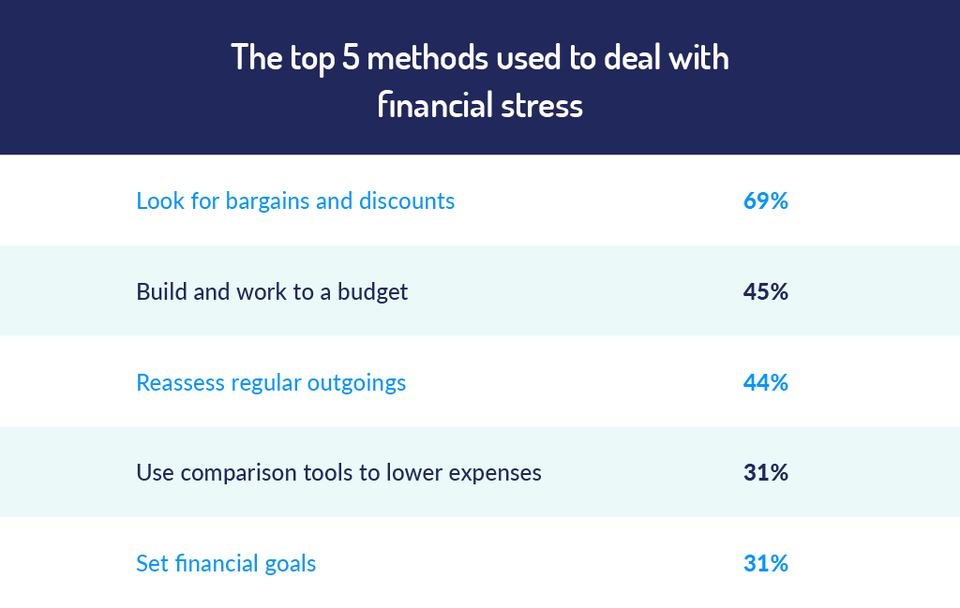
Whilst money may be a prevalent factor of daily stress, just under 1 in 10 (8%) don't take any action to deal with their financial worries.
This laid back attitude to working on financial wellbeing is most common in the 18–24 year old age group, with just 13% taking any action to deal with financial stress.
For those that do work to improve financial wellbeing, the most common method used is to ‘look for bargains and discounts’, with 69% of adults stating that this is how they tackle their feelings of financial stress, followed by 45% who ‘build and work to a budget'.
Most common methods to tackle financial stress include:
1. Look for bargains and discounts – 69%
2. Building and working to a budget – 45%
3. Reassess regular outgoings – 44%
4. Use comparison tools to lower expenses – 31%
5. Set financial goals – 31%
6. Build emergency funds – 31%
7. Prepare for the future such as planning for pension – 27%
8. Talk to someone about my concerns – 19%
9. See an advisor – 3%
Adults believe it will be ‘1–5 years’ until they are satisfied with their finances – regardless of their current age
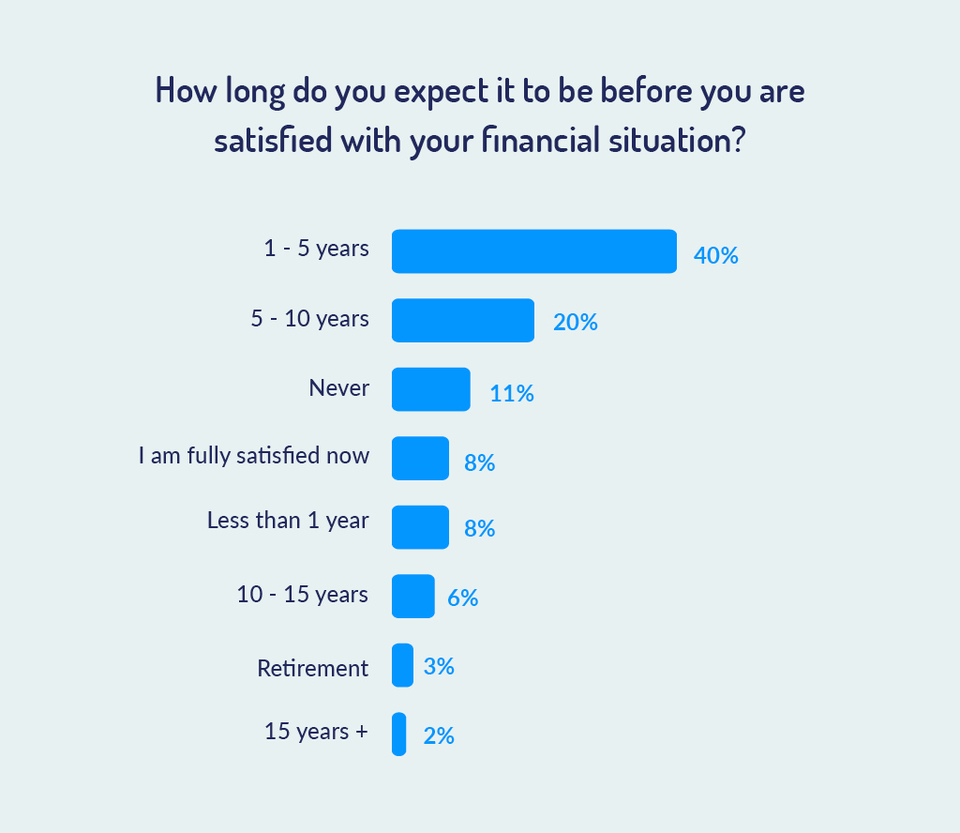
Whilst UK workers may not be satisfied now, a large 40% expect it will just take 1–5 more years before they are content with their financial situation.
Surprisingly, 1–5 years is the most popular time frame until expected financial satisfaction, regardless of the current age of the respondent. 41% of 18–24 year olds believe they will be satisfied with their financial situation in this time frame, alongside 46% of 25–34 year olds, 38% of 35–44, 33% of 45–54 and 27% of 55+.
However, 1 in 5 believe that financial satisfaction will take slightly longer, with ‘5–10 years’ coming in second place.
Sadly, over 1 in 10 believe that they will never be fully satisfied with their financial situation while just 8% of employed adults are satisfied with their current financial situation.
Help your employees to tackle their financial wellbeing
At Perkbox we’re all about improving the employee experience by providing a wide range of benefits, discounts and freebies, as well as creating a great employee assistance program. If you’re interested in learning more about the Perkbox platform, talk to us to see it in action or let your company know about it. If you're not sure yet, why not check out our employee wellness brochure?




Share